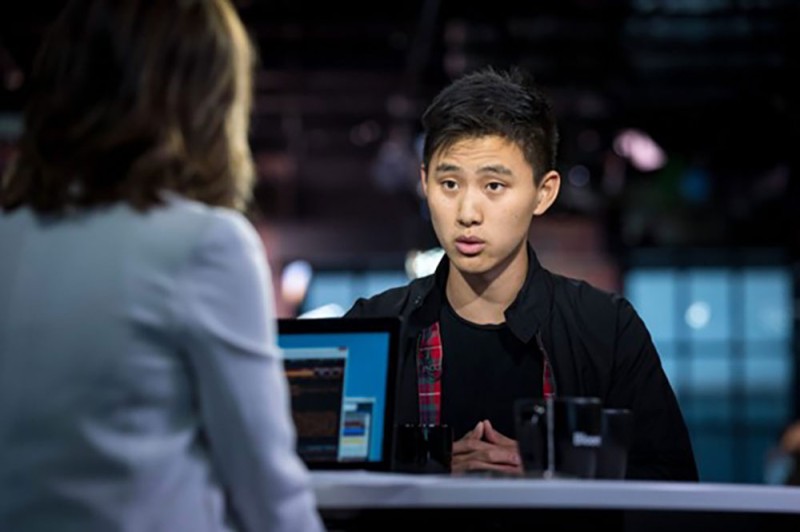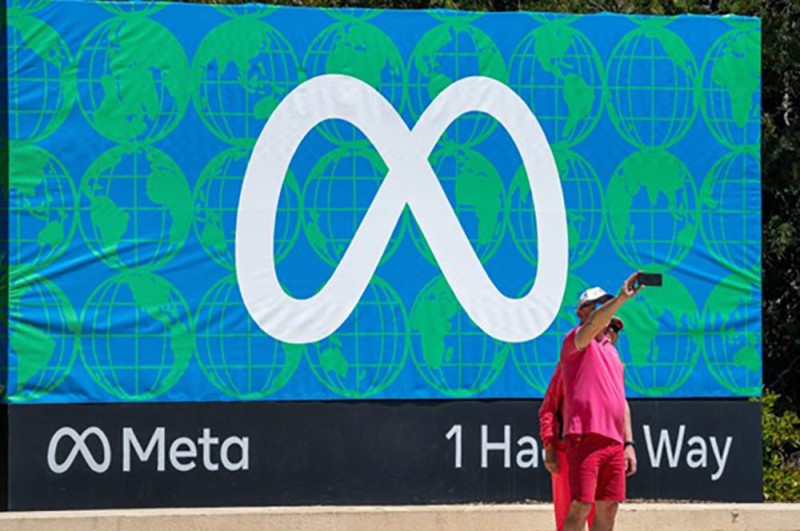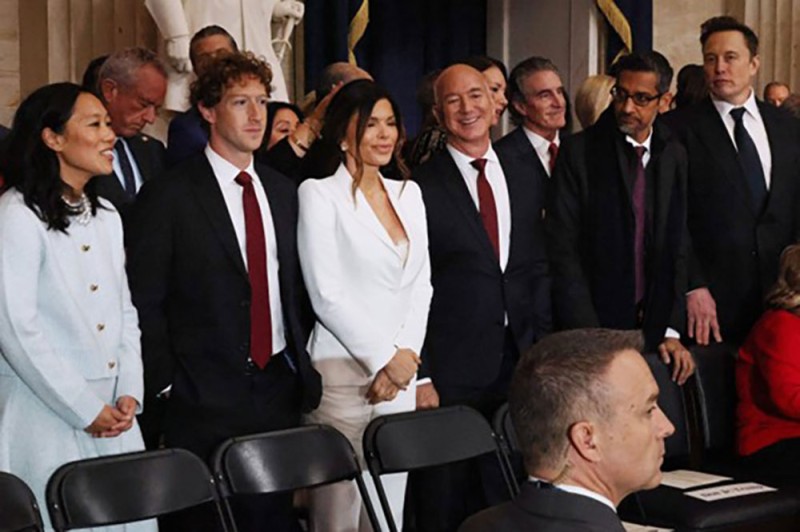
2023年11月,约100名宾客在美国犹他州风景如画的瓦萨奇山脉中测量头围、试戴定制的毛毡牛仔帽,他们有充分的理由感到与众不同。这群AI公司高管、风险投资家、政府官员和政策界人士都经过精心挑选,前来参加一场为期三天的秘密闭门会议,主题聚焦AI对国家安全的影响。
主持这场会议的是数据标注AI初创公司Scale的年轻首席执行官汪滔(Alexandr Wang)。当时他的公司成立仅八年,估值已达130亿美元。但与Scale的长期天使投资人纳特·弗里德曼在蒙太奇鹿谷度假村(Montage Deer Valley)共同举办的此次活动,显然意在昭示汪滔的地位远非硅谷新晋神童那么简单。年仅26岁的汪滔与白发苍苍的五角大楼高层们坐在一起,就AI军备竞赛等重大议题侃侃而谈。
一位与会者回忆汪滔是一位口才出众的主持人,但带有推销目的。他对《财富》杂志表示:“我的印象是,这有点像一场推销活动,意在向他的投资者和政府客户炫耀他拥有极佳的人脉网络。”另一位与会者称汪滔是位“慷慨”的东道主,但补充说他对其“戏剧性的鹰派姿态”感到不安。他描述汪滔“相当明显地试图讨好国家安全机构”。
在与会者从犹他州返程途中,发生了一件出人意料、极具戏剧性的后续事件:会议结束后的第二天,OpenAI首席执行官山姆·奥尔特曼突遭解雇。48小时内,随着OpenAI非营利性董事会上出现混乱,汪滔和弗里德曼都曾被低调接触,询问他们是否愿意出任临时首席执行官。两人均婉拒了邀请。
然而,彼时情况已很明朗:在华盛顿某些圈子中早已被称为美国“AI智囊”的汪滔,自2016年与郭如意共同创立Scale AI以来,已取得了长足发展。当时他年仅19岁,刚从麻省理工学院(MIT)辍学,正在创建一家服务于自动驾驶汽车的数据标注初创公司(旨在帮助AI系统学会区分,例如,一个飘飞的塑料袋和一名行人)。
短短几年间,他就将Scale打造成了一家生成式AI巨头——首先是雇佣了数万名员工,手动筛选和标注海量数据集以帮助训练AI模型;继而通过强化学习等技术,为OpenAI、SAP和丰田(Toyota)等公司运行模型评估和进行系统微调。2021年,年仅24岁的他在一轮融资后短暂成为全球最年轻的白手起家的亿万富翁,该轮融资使公司估值超过70亿美元。
但本月有消息称,汪滔将加入Meta,成为新“超级智能”团队一员,直接向马克·扎克伯格汇报,且这属于一笔价值143亿美元的人才并购交易的一部分。消息传出后,行业观察家们深感震惊。
这笔交易对Scale的估值高达290亿美元,据报道汪滔的个人持股价值约50亿美元,是Meta有史以来最大规模的外部投资。对Meta而言,该笔交易的风险更高,因为该公司的业务正在向快速发展的AI时代转型,并与谷歌(Google)、OpenAI等巨头竞相开发全能的通用人工智能和“超级智能”能力。扎克伯格似乎在汪滔身上,以及在Meta所收购的Scale公司49%的股份中,看到了一件秘密武器。甚至有传言称汪滔可能被擢升为Meta整个AI业务的负责人——这些传言更添困惑:一位业务更依赖人工标注而非大语言模型的年轻企业家,如何融入Meta追求AI霸权的征程?
《财富》杂志采访了十多位与汪滔关系密切的人士,包括Scale现任和前任员工、投资者、熟人和竞争对手,以追溯这位28岁的麻省理工学院辍学者如何打造了一家公司,使其成为AI热潮中最丰厚交易之一的核心,并理解Meta为何在其身上下如此重注。Meta拒绝置评,并拒绝安排汪滔接受采访。
一位Scale前经理表示:“汪滔是个了不起的招聘者,一位非常精明的商人。谁知道这个计划会不会成功?也许他能打造出一支更优秀的AI团队,使其变得更强大,也许他会失败,但你总要押注某个人来做这件事。世界上可能只有少数几个人值得押注,我认为他可能就是其中之一。”

当扎克伯格遇见汪滔
Meta与Scale的渊源可追溯至2019年,当时这家社交媒体公司开始将Scale用作其AI项目的数据提供商。2024年,Scale在F轮融资中筹集到10亿美元,Meta是投资者之一,抢购了这家初创公司的50万股股票。
据一位熟悉谈判情况的消息人士透露,扎克伯格和汪滔从今年四月开始花更多时间相处。当时扎克伯格主动联系汪滔,表达了希望更紧密合作的意愿。作为Meta的首席执行官,扎克伯格也曾拥有“全球最年轻白手起家亿万富翁”的头衔。他开始邀请汪滔到他位于太浩湖和帕洛阿尔托的家中私下会晤,汪滔的见解很快得到了扎克伯格的信任。据The Information报道,顾问们表示,扎克伯格有时会在与他们交谈时引用汪滔的观点。
两位首席执行官之间密切交流时,恰逢扎克伯格对Meta在追赶OpenAI、Anthropic和Google DeepMind等竞争对手AI实验室方面所面临的困境日益感到沮丧。Meta成功创建了名为Llama的一系列成功开源AI模型,但似乎始终无法长期保持领先地位。OpenAI、Anthropic和Google DeepMind总会不可避免地凭借其AI模型吸引AI开发者更多的关注和心智份额,从而超越Meta。
随着2025年4月Llama 4的发布,Meta的低迷演变成了危机。有关其可能夸大性能指标、仓促发布、缺乏透明度等指控,以及Meta未能跟上中国的深度探索(DeepSeek)等开源AI竞争对手步伐的迹象,导致业内许多人宣称Meta的最新AI模型是个失败之作。(Meta称有关其操控性能指标的说法“完全不属实”,并将Llama 4发布时“表现参差不齐”的报道归因于早期漏洞)。

为重获优势,Meta已积极行动起来,大力招揽AI人才并调整其战略。本周有新闻报道称,Meta近期就收购AI公司Perplexity和初创公司Safe Superintelligence进行了谈判。后者由OpenAI前首席科学家伊利亚·苏茨克维创立。据一位熟悉内情的消息人士透露,Meta目前正洽谈收购由Scale投资人弗里德曼和Safe Superintelligence高管丹尼尔·格罗斯管理的AI风险投资基金。与Scale的谈判似乎与Meta的许多其他洽谈同步进行。
据熟悉谈判情况的消息人士称,汪滔起初拒绝了扎克伯格邀请他加入Meta的提议,并表示如果要他离开自己的初创公司,任何交易都必须能为Scale的投资者带来立竿见影(且物有所值)的回报。整个五月,两位CEO进行了断断续续的讨论,方案从Meta提议向Scale投资50亿美元换取无投票权股份,最终演变为Meta投资143亿美元收购Scale 49%的无投票权但未来可转换的股份。(该交易还包含一项毒丸条款:若汪滔离开Meta,股份将按1.5倍的比例转换,造成额外稀释,以此激励汪滔对Meta做出长期承诺。)
一些与汪滔关系密切的人士表示,他与扎克伯格达成的这笔交易表明了他对投资者和员工的负责态度,而非为了一己私利获利退出而抛弃他们。(注:汪滔的英文姓名"Alexandr"拼写中特意省略了第二个"e",使其成为八个字符,在中华文化中与好运相关联。)尽管如此,汪滔将离开的消息对许多与Scale和他本人相关的人来说仍是一个巨大的意外。
上个月离开公司的Scale AI前经理表示:“这令人非常震惊。我从未想过汪滔会离开Scale,尤其是在我们刚宣布以250亿美元估值进行股权要约收购之后。这一切发生得太快了。”
针对《财富》杂志的置评请求,Scale方面援引了新任首席执行官杰森·德罗格的一篇博客文章作为回应。这篇文章申明公司将继续保持独立,承诺不偏袒任何特定AI模型,并暗示即将发布公告。
时机完美的战略转型,铸就成功之路
交易公开宣布后,汪滔在公司位于旧金山市场南的办公室向Scale员工发表了讲话。当他沿着蜿蜒的楼梯走到办公楼的中庭时,员工们起立鼓掌。他向员工们讲述自己在Scale的岁月以及大学一年级时创办公司的经历,期间数度哽咽。
汪滔的思绪或许飘回了更遥远的童年。作为移民之子,他的父母是新墨西哥州洛斯阿拉莫斯国家实验室(Los Alamos National Laboratory)的核物理学家。该实验室由J·罗伯特·奥本海默领导,曾是研发首批原子弹的绝密基地。
他在去年接受《财富》杂志采访时表示:“在我的家乡,基本上每个人的父母都在为国家实验室工作。我周围的每个成年人都是科学家,他们都曾宣誓运用自己的科学能力和力量来发展技术,以确保美国的长久安全。”
Y Combinator的团队合伙人贾里德·弗里德曼表示,这种成长环境为汪滔将Scale打造成一家成功企业提供了模板。弗里德曼表示:“他组建了一支人才密度极高的团队,营造了一种浓厚的文化氛围,成员与他相似——都是数学和计算机科学(CS)领域的顶尖学生。”

汪滔在高中时就参加过全国数学竞赛,在麻省理工学院就读一年后便辍学,联手问答网站Quora的产品设计师郭如意开始追逐创业梦。郭如意本人也曾从卡内基梅隆大学(Carnegie Mellon)辍学,去追求泰尔奖学金(Thiel Fellowship),并曾是Snap公司的首位女性设计师。两人最初计划为医生礼宾服务开发技术,但在2016年夏季加入初创企业加速器Y Combinator后,他们最终将方向转向了数据标注。
弗里德曼回忆道:“他们最初的想法与后来的创业项目截然不同,第一个夏天的大部分时间都花在弄清楚要做什么产品上”。弗里德曼在2016年担任汪滔和郭如意在Y Combinator的合作伙伴。
在转向数据标注后,Scale便在迅速扩张且资金雄厚的自动驾驶汽车初创企业群体中找到了完美的客户基础。
一位于2022年离职的早期员工表示,汪滔身体力行地践行着公司“雄心塑造现实”的信条。“汪滔本人会在需要时深度参与客户对接,包括深入钻研技术挑战,以及协助在业务层面与高层建立人脉、进行谈判,以帮助我们赢得客户和新业务。”
另一位消息人士(即Scale前经理)描述了在每天长达两小时的会议上,“我们会逐一审查每一个客户账户。”这位知情人士称,这种惯例并非人人喜欢,“但说实话,现在回想起来,这迫使每个人都变得非常严谨。”
随着公司的发展,两位联合创始人之间的紧张关系很快浮出水面。郭如意招募了汪滔,而且她是公司最初的首席执行官。但据一位熟悉内情的消息人士称,两位创始人无法和睦相处,对彼此应如何履行职责的问题上发生冲突。根据此人的说法,董事会站在了汪滔一边,他成为首席执行官,而郭如意于2018年离开了公司。郭如意对《财富》杂志表示,在A轮融资后,汪滔提出由他担任首席执行官一职,认为“他更适合担任一家API公司的门面”,她同意这一建议。她在电子邮件中表示:“我不看重头衔,对交接没有意见。”郭如意对《财富》杂志表示,她从Meta的这笔交易中获得了7.5亿美元,但未评论她与汪滔目前的关系状况。
近年来,Scale因其劳工实践而引发担忧。该公司在全球雇佣了估计数万名合同工,进行人工数据标注和图像审核。2024年,美国劳工部对Scale对《公平劳动标准法》(Fair Labor Standards Act)的遵守情况展开调查,特别是在薪酬公平和工人分类等方面,该调查于今年五月结束。目前有两起针对Scale的劳工诉讼正在进行中。代表劳工向该公司提起诉讼的克拉克森律师事务所(Clarkson Law Firm)合伙人格伦·达纳斯估计,该公司的合同工数量可能约有60,000人。
“他绝不只是个推销员”
Meta与Scale这笔交易引人注目的一点在于,汪滔一直强调自己并非研究员,Scale AI也并非在构建AI模型。相反,它的目标是为整个生成式AI生态系统提供用于训练模型的高质量数据。
汪滔去年对《财富》杂志表示:“我们并没有在开发领先的大语言模型,而是在服务于整个生态系统。几乎所有主流大语言模型都是基于我们的数据工场构建。”
Scale在与客户合作时也秉持中立立场。它曾于2019年与OpenAI团队(该团队后来成立了Anthropic)合作,进行了最早的基于人类反馈的强化学习(RLHF)实验之一。Scale继续与这两家AI初创公司保持合作。汪滔表示:“我们在整个生态系统中保持中立,并且能够与AI生态栈中所有相关公司建立非常牢固的关系。”
Scale曾表示将继续作为独立公司运营(由汪滔担任董事长),服务其他客户。据熟悉谈判情况的消息人士称,根据交易条款,Meta在未来五年内每年将至少花费5亿美元购买Scale的数据。但如今,中立性的形象似乎已荡然无存。交易宣布后,有媒体报道称谷歌和OpenAI都计划终止与Scale的合作关系。一些行业观察家推测,Meta的真实战略始终是进行一场数据圈地运动,旨在确保获取构建AI模型的关键要素之一的主要来源——并剥夺他人获取这些要素的机会。
但《财富》杂志接触的几位业内人士对此说法表示怀疑。Scale AI的竞争对手Appen的首席执行官瑞安·科恩表示,他不认为Meta/Scale交易是为了整合数据供应商或让寻求数据的竞争对手陷入困境。他表示,这么做存在风险,因为拥有不同专长和专业知识的数据供应商所带来的数据多样性具有巨大益处。
那么,扎克伯格豪掷143亿美元,真正要获取的关键之物是什么?
几位与两家公司关系密切的消息人士表示,他们听说Meta正在考虑由汪滔担任整个AI部门的潜在领导者。这个职位的权限远远高于“超级智能”团队(有媒体报道称该团队将由50人组成,并由汪滔领导)。
Meta前工程负责人埃里克·梅耶尔表示,如果任命汪滔为整个Meta的“首席AI官”,他不会感到意外。他表示:“把所有(AI)事务整合到一个部门是合理的。事实上,如果马克(扎克伯格)投入如此巨资后,却不进行彻底重组整合所有AI业务,我反而会感到意外。”
Meta庞大的AI版图包括以产品为中心的生成式AI团队、专注于进一步开发Llama的通用人工智能基础部门,以及由“AI教父”杨立昆创立并仍担任Meta首席科学家的FAIR(基础AI研究)部门。此外,该公司还有一个独立的商业AI产品团队,由前赛富时(Salesforce)AI负责人史宗玮领导。

话虽如此,由于汪滔并非计算机科学家出身,选择他担任最高职位将是一个打破常规的决定。在Meta工作的博士及其他AI研究人员是否会接受汪滔作为他们的领导者,这是一个巨大的未知数。一位现任Meta AI研究员直截了当地表示:“不可能。”这位Meta研究员表示,汪滔是个商人,在AI模型方面没有深厚的资历。一位曾在Meta FAIR团队工作过的前Meta AI研究员也认同此观点:“他不会轻易被大家所接受。”
扎克伯格很可能注意到这一警告,因为Meta的研究实验室已经出现人才流失——Llama最初的14位开发人员中已有11人离职加入竞争对手。另一方面,汪滔的支持者指出,尽管他不是计算机科学家,但他完全有能力抓住AI技术的细节。
那位前Scale经理表示:“我们有时忘记了他拥有强大的技术能力。他绝不只是个推销员。他在这方面非常出色,但他绝不仅是个推销员。”
完成难以预测的平台变革
年营收超过1,640亿美元的Meta深知,要想实质性推动其业务发展,必须依靠真正独特的东西。而扎克伯格重金招揽汪滔和Scale公司,其押注的很可能是一种超越任何简单类别的真正价值。
一位与汪滔关系密切的消息人士对《财富》杂志表示,外界的惊讶和困惑源于汪滔不符合典型的科技界人物模板。他表示:“硅谷擅长给人贴标签,他们喜欢说,这个人是技术型的,那个人是商业型的,汪滔是真正独一无二的人。”在行业格局变化之际,这种特质尤为宝贵。

如果AI真如某些人所预期的那样具有颠覆性,其影响将远超以往任何撼动科技行业的平台变革,带来难以预测的风险与机遇。AI的出现,已经开始让硅谷公司曾基本被拒之门外的庞大军事合同市场出现松动。Meta正与无人机制造商Anduril建立联系,而OpenAI等竞争对手也在敲定各自的国防安全合同。
一位前国防部官员表示:“我深切感受到,Meta正在积极探索,期望在美国国家安全领域扮演重要的领导角色,甚至该公司在这方面的积极性领先于其他竞争对手。”
正如汪滔在2023年犹他州会议上的表现所展示的那样,Meta的这项新投资在该领域定位精准。同样引人注目的是,特朗普政府的科技政策办公室主任兼总统科学顾问迈克尔·克拉齐奥斯,曾在特朗普两届任期之间任职于Scale公司。
这位前国防部官员如此评价汪滔:“他一直非常聪明且极其机智。他似乎投身于许多人都有些反感的领域,即参与华盛顿的政治活动。我认为无论是从代际还是个性或其他方面来看,汪滔确实明白这样做的必要性——他似乎拥有一种真正的第六感。”
然而,尽管Meta可以动用在华盛顿特区能获得的一切帮助(一位华盛顿内部人士说道:“华盛顿特区最热衷憎恨的人莫过于扎克伯格了;这对某些人来说算是一种消遣。”),但汪滔若想与扎克伯格的合作取得成功,最终需要的贡献远不止于游说服务。在汪滔的支持者(包括一位认识他约十年的消息人士)看来,他的多面手特质将助力Meta打开局面,应对未来的任何挑战:“在任何一个问题上,他都是我见过最擅长在关键接触点上解决问题的人。”
从更长远的角度看,此人呼应了一种普遍看法,即汪滔的征程才刚刚开始。这位消息人士表示:“汪滔可能会再创办一家公司,或者创办一批公司。假以时日,他有机会在未来30年成为硅谷最高层级的领军人物之一。” (*)
译者:刘进龙
审校:汪皓
2023年11月,约100名宾客在美国犹他州风景如画的瓦萨奇山脉中测量头围、试戴定制的毛毡牛仔帽,他们有充分的理由感到与众不同。这群AI公司高管、风险投资家、政府官员和政策界人士都经过精心挑选,前来参加一场为期三天的秘密闭门会议,主题聚焦AI对国家安全的影响。
主持这场会议的是数据标注AI初创公司Scale的年轻首席执行官汪滔(Alexandr Wang)。当时他的公司成立仅八年,估值已达130亿美元。但与Scale的长期天使投资人纳特·弗里德曼在蒙太奇鹿谷度假村(Montage Deer Valley)共同举办的此次活动,显然意在昭示汪滔的地位远非硅谷新晋神童那么简单。年仅26岁的汪滔与白发苍苍的五角大楼高层们坐在一起,就AI军备竞赛等重大议题侃侃而谈。
一位与会者回忆汪滔是一位口才出众的主持人,但带有推销目的。他对《财富》杂志表示:“我的印象是,这有点像一场推销活动,意在向他的投资者和政府客户炫耀他拥有极佳的人脉网络。”另一位与会者称汪滔是位“慷慨”的东道主,但补充说他对其“戏剧性的鹰派姿态”感到不安。他描述汪滔“相当明显地试图讨好国家安全机构”。
在与会者从犹他州返程途中,发生了一件出人意料、极具戏剧性的后续事件:会议结束后的第二天,OpenAI首席执行官山姆·奥尔特曼突遭解雇。48小时内,随着OpenAI非营利性董事会上出现混乱,汪滔和弗里德曼都曾被低调接触,询问他们是否愿意出任临时首席执行官。两人均婉拒了邀请。
然而,彼时情况已很明朗:在华盛顿某些圈子中早已被称为美国“AI智囊”的汪滔,自2016年与郭如意共同创立Scale AI以来,已取得了长足发展。当时他年仅19岁,刚从麻省理工学院(MIT)辍学,正在创建一家服务于自动驾驶汽车的数据标注初创公司(旨在帮助AI系统学会区分,例如,一个飘飞的塑料袋和一名行人)。
短短几年间,他就将Scale打造成了一家生成式AI巨头——首先是雇佣了数万名员工,手动筛选和标注海量数据集以帮助训练AI模型;继而通过强化学习等技术,为OpenAI、SAP和丰田(Toyota)等公司运行模型评估和进行系统微调。2021年,年仅24岁的他在一轮融资后短暂成为全球最年轻的白手起家的亿万富翁,该轮融资使公司估值超过70亿美元。
但本月有消息称,汪滔将加入Meta,成为新“超级智能”团队一员,直接向马克·扎克伯格汇报,且这属于一笔价值143亿美元的人才并购交易的一部分。消息传出后,行业观察家们深感震惊。
这笔交易对Scale的估值高达290亿美元,据报道汪滔的个人持股价值约50亿美元,是Meta有史以来最大规模的外部投资。对Meta而言,该笔交易的风险更高,因为该公司的业务正在向快速发展的AI时代转型,并与谷歌(Google)、OpenAI等巨头竞相开发全能的通用人工智能和“超级智能”能力。扎克伯格似乎在汪滔身上,以及在Meta所收购的Scale公司49%的股份中,看到了一件秘密武器。甚至有传言称汪滔可能被擢升为Meta整个AI业务的负责人——这些传言更添困惑:一位业务更依赖人工标注而非大语言模型的年轻企业家,如何融入Meta追求AI霸权的征程?
《财富》杂志采访了十多位与汪滔关系密切的人士,包括Scale现任和前任员工、投资者、熟人和竞争对手,以追溯这位28岁的麻省理工学院辍学者如何打造了一家公司,使其成为AI热潮中最丰厚交易之一的核心,并理解Meta为何在其身上下如此重注。Meta拒绝置评,并拒绝安排汪滔接受采访。
一位Scale前经理表示:“汪滔是个了不起的招聘者,一位非常精明的商人。谁知道这个计划会不会成功?也许他能打造出一支更优秀的AI团队,使其变得更强大,也许他会失败,但你总要押注某个人来做这件事。世界上可能只有少数几个人值得押注,我认为他可能就是其中之一。”
当扎克伯格遇见汪滔
Meta与Scale的渊源可追溯至2019年,当时这家社交媒体公司开始将Scale用作其AI项目的数据提供商。2024年,Scale在F轮融资中筹集到10亿美元,Meta是投资者之一,抢购了这家初创公司的50万股股票。
据一位熟悉谈判情况的消息人士透露,扎克伯格和汪滔从今年四月开始花更多时间相处。当时扎克伯格主动联系汪滔,表达了希望更紧密合作的意愿。作为Meta的首席执行官,扎克伯格也曾拥有“全球最年轻白手起家亿万富翁”的头衔。他开始邀请汪滔到他位于太浩湖和帕洛阿尔托的家中私下会晤,汪滔的见解很快得到了扎克伯格的信任。据The Information报道,顾问们表示,扎克伯格有时会在与他们交谈时引用汪滔的观点。
两位首席执行官之间密切交流时,恰逢扎克伯格对Meta在追赶OpenAI、Anthropic和Google DeepMind等竞争对手AI实验室方面所面临的困境日益感到沮丧。Meta成功创建了名为Llama的一系列成功开源AI模型,但似乎始终无法长期保持领先地位。OpenAI、Anthropic和Google DeepMind总会不可避免地凭借其AI模型吸引AI开发者更多的关注和心智份额,从而超越Meta。
随着2025年4月Llama 4的发布,Meta的低迷演变成了危机。有关其可能夸大性能指标、仓促发布、缺乏透明度等指控,以及Meta未能跟上中国的深度探索(DeepSeek)等开源AI竞争对手步伐的迹象,导致业内许多人宣称Meta的最新AI模型是个失败之作。(Meta称有关其操控性能指标的说法“完全不属实”,并将Llama 4发布时“表现参差不齐”的报道归因于早期漏洞)。
为重获优势,Meta已积极行动起来,大力招揽AI人才并调整其战略。本周有新闻报道称,Meta近期就收购AI公司Perplexity和初创公司Safe Superintelligence进行了谈判。后者由OpenAI前首席科学家伊利亚·苏茨克维创立。据一位熟悉内情的消息人士透露,Meta目前正洽谈收购由Scale投资人弗里德曼和Safe Superintelligence高管丹尼尔·格罗斯管理的AI风险投资基金。与Scale的谈判似乎与Meta的许多其他洽谈同步进行。
据熟悉谈判情况的消息人士称,汪滔起初拒绝了扎克伯格邀请他加入Meta的提议,并表示如果要他离开自己的初创公司,任何交易都必须能为Scale的投资者带来立竿见影(且物有所值)的回报。整个五月,两位CEO进行了断断续续的讨论,方案从Meta提议向Scale投资50亿美元换取无投票权股份,最终演变为Meta投资143亿美元收购Scale 49%的无投票权但未来可转换的股份。(该交易还包含一项毒丸条款:若汪滔离开Meta,股份将按1.5倍的比例转换,造成额外稀释,以此激励汪滔对Meta做出长期承诺。)
一些与汪滔关系密切的人士表示,他与扎克伯格达成的这笔交易表明了他对投资者和员工的负责态度,而非为了一己私利获利退出而抛弃他们。(注:汪滔的英文姓名"Alexandr"拼写中特意省略了第二个"e",使其成为八个字符,在中华文化中与好运相关联。)尽管如此,汪滔将离开的消息对许多与Scale和他本人相关的人来说仍是一个巨大的意外。
上个月离开公司的Scale AI前经理表示:“这令人非常震惊。我从未想过汪滔会离开Scale,尤其是在我们刚宣布以250亿美元估值进行股权要约收购之后。这一切发生得太快了。”
针对《财富》杂志的置评请求,Scale方面援引了新任首席执行官杰森·德罗格的一篇博客文章作为回应。这篇文章申明公司将继续保持独立,承诺不偏袒任何特定AI模型,并暗示即将发布公告。
时机完美的战略转型,铸就成功之路
交易公开宣布后,汪滔在公司位于旧金山市场南的办公室向Scale员工发表了讲话。当他沿着蜿蜒的楼梯走到办公楼的中庭时,员工们起立鼓掌。他向员工们讲述自己在Scale的岁月以及大学一年级时创办公司的经历,期间数度哽咽。
汪滔的思绪或许飘回了更遥远的童年。作为移民之子,他的父母是新墨西哥州洛斯阿拉莫斯国家实验室(Los Alamos National Laboratory)的核物理学家。该实验室由J·罗伯特·奥本海默领导,曾是研发首批原子弹的绝密基地。
他在去年接受《财富》杂志采访时表示:“在我的家乡,基本上每个人的父母都在为国家实验室工作。我周围的每个成年人都是科学家,他们都曾宣誓运用自己的科学能力和力量来发展技术,以确保美国的长久安全。”
Y Combinator的团队合伙人贾里德·弗里德曼表示,这种成长环境为汪滔将Scale打造成一家成功企业提供了模板。弗里德曼表示:“他组建了一支人才密度极高的团队,营造了一种浓厚的文化氛围,成员与他相似——都是数学和计算机科学(CS)领域的顶尖学生。”
汪滔在高中时就参加过全国数学竞赛,在麻省理工学院就读一年后便辍学,联手问答网站Quora的产品设计师郭如意开始追逐创业梦。郭如意本人也曾从卡内基梅隆大学(Carnegie Mellon)辍学,去追求泰尔奖学金(Thiel Fellowship),并曾是Snap公司的首位女性设计师。两人最初计划为医生礼宾服务开发技术,但在2016年夏季加入初创企业加速器Y Combinator后,他们最终将方向转向了数据标注。
弗里德曼回忆道:“他们最初的想法与后来的创业项目截然不同,第一个夏天的大部分时间都花在弄清楚要做什么产品上”。弗里德曼在2016年担任汪滔和郭如意在Y Combinator的合作伙伴。
在转向数据标注后,Scale便在迅速扩张且资金雄厚的自动驾驶汽车初创企业群体中找到了完美的客户基础。
一位于2022年离职的早期员工表示,汪滔身体力行地践行着公司“雄心塑造现实”的信条。“汪滔本人会在需要时深度参与客户对接,包括深入钻研技术挑战,以及协助在业务层面与高层建立人脉、进行谈判,以帮助我们赢得客户和新业务。”
另一位消息人士(即Scale前经理)描述了在每天长达两小时的会议上,“我们会逐一审查每一个客户账户。”这位知情人士称,这种惯例并非人人喜欢,“但说实话,现在回想起来,这迫使每个人都变得非常严谨。”
随着公司的发展,两位联合创始人之间的紧张关系很快浮出水面。郭如意招募了汪滔,而且她是公司最初的首席执行官。但据一位熟悉内情的消息人士称,两位创始人无法和睦相处,对彼此应如何履行职责的问题上发生冲突。根据此人的说法,董事会站在了汪滔一边,他成为首席执行官,而郭如意于2018年离开了公司。郭如意对《财富》杂志表示,在A轮融资后,汪滔提出由他担任首席执行官一职,认为“他更适合担任一家API公司的门面”,她同意这一建议。她在电子邮件中表示:“我不看重头衔,对交接没有意见。”郭如意对《财富》杂志表示,她从Meta的这笔交易中获得了7.5亿美元,但未评论她与汪滔目前的关系状况。
近年来,Scale因其劳工实践而引发担忧。该公司在全球雇佣了估计数万名合同工,进行人工数据标注和图像审核。2024年,美国劳工部对Scale对《公平劳动标准法》(Fair Labor Standards Act)的遵守情况展开调查,特别是在薪酬公平和工人分类等方面,该调查于今年五月结束。目前有两起针对Scale的劳工诉讼正在进行中。代表劳工向该公司提起诉讼的克拉克森律师事务所(Clarkson Law Firm)合伙人格伦·达纳斯估计,该公司的合同工数量可能约有60,000人。
“他绝不只是个推销员”
Meta与Scale这笔交易引人注目的一点在于,汪滔一直强调自己并非研究员,Scale AI也并非在构建AI模型。相反,它的目标是为整个生成式AI生态系统提供用于训练模型的高质量数据。
汪滔去年对《财富》杂志表示:“我们并没有在开发领先的大语言模型,而是在服务于整个生态系统。几乎所有主流大语言模型都是基于我们的数据工场构建。”
Scale在与客户合作时也秉持中立立场。它曾于2019年与OpenAI团队(该团队后来成立了Anthropic)合作,进行了最早的基于人类反馈的强化学习(RLHF)实验之一。Scale继续与这两家AI初创公司保持合作。汪滔表示:“我们在整个生态系统中保持中立,并且能够与AI生态栈中所有相关公司建立非常牢固的关系。”
Scale曾表示将继续作为独立公司运营(由汪滔担任董事长),服务其他客户。据熟悉谈判情况的消息人士称,根据交易条款,Meta在未来五年内每年将至少花费5亿美元购买Scale的数据。但如今,中立性的形象似乎已荡然无存。交易宣布后,有媒体报道称谷歌和OpenAI都计划终止与Scale的合作关系。一些行业观察家推测,Meta的真实战略始终是进行一场数据圈地运动,旨在确保获取构建AI模型的关键要素之一的主要来源——并剥夺他人获取这些要素的机会。
但《财富》杂志接触的几位业内人士对此说法表示怀疑。Scale AI的竞争对手Appen的首席执行官瑞安·科恩表示,他不认为Meta/Scale交易是为了整合数据供应商或让寻求数据的竞争对手陷入困境。他表示,这么做存在风险,因为拥有不同专长和专业知识的数据供应商所带来的数据多样性具有巨大益处。
那么,扎克伯格豪掷143亿美元,真正要获取的关键之物是什么?
几位与两家公司关系密切的消息人士表示,他们听说Meta正在考虑由汪滔担任整个AI部门的潜在领导者。这个职位的权限远远高于“超级智能”团队(有媒体报道称该团队将由50人组成,并由汪滔领导)。
Meta前工程负责人埃里克·梅耶尔表示,如果任命汪滔为整个Meta的“首席AI官”,他不会感到意外。他表示:“把所有(AI)事务整合到一个部门是合理的。事实上,如果马克(扎克伯格)投入如此巨资后,却不进行彻底重组整合所有AI业务,我反而会感到意外。”
Meta庞大的AI版图包括以产品为中心的生成式AI团队、专注于进一步开发Llama的通用人工智能基础部门,以及由“AI教父”杨立昆创立并仍担任Meta首席科学家的FAIR(基础AI研究)部门。此外,该公司还有一个独立的商业AI产品团队,由前赛富时(Salesforce)AI负责人史宗玮领导。
话虽如此,由于汪滔并非计算机科学家出身,选择他担任最高职位将是一个打破常规的决定。在Meta工作的博士及其他AI研究人员是否会接受汪滔作为他们的领导者,这是一个巨大的未知数。一位现任Meta AI研究员直截了当地表示:“不可能。”这位Meta研究员表示,汪滔是个商人,在AI模型方面没有深厚的资历。一位曾在Meta FAIR团队工作过的前Meta AI研究员也认同此观点:“他不会轻易被大家所接受。”
扎克伯格很可能注意到这一警告,因为Meta的研究实验室已经出现人才流失——Llama最初的14位开发人员中已有11人离职加入竞争对手。另一方面,汪滔的支持者指出,尽管他不是计算机科学家,但他完全有能力抓住AI技术的细节。
那位前Scale经理表示:“我们有时忘记了他拥有强大的技术能力。他绝不只是个推销员。他在这方面非常出色,但他绝不仅是个推销员。”
完成难以预测的平台变革
年营收超过1,640亿美元的Meta深知,要想实质性推动其业务发展,必须依靠真正独特的东西。而扎克伯格重金招揽汪滔和Scale公司,其押注的很可能是一种超越任何简单类别的真正价值。
一位与汪滔关系密切的消息人士对《财富》杂志表示,外界的惊讶和困惑源于汪滔不符合典型的科技界人物模板。他表示:“硅谷擅长给人贴标签,他们喜欢说,这个人是技术型的,那个人是商业型的,汪滔是真正独一无二的人。”在行业格局变化之际,这种特质尤为宝贵。
如果AI真如某些人所预期的那样具有颠覆性,其影响将远超以往任何撼动科技行业的平台变革,带来难以预测的风险与机遇。AI的出现,已经开始让硅谷公司曾基本被拒之门外的庞大军事合同市场出现松动。Meta正与无人机制造商Anduril建立联系,而OpenAI等竞争对手也在敲定各自的国防安全合同。
一位前国防部官员表示:“我深切感受到,Meta正在积极探索,期望在美国国家安全领域扮演重要的领导角色,甚至该公司在这方面的积极性领先于其他竞争对手。”
正如汪滔在2023年犹他州会议上的表现所展示的那样,Meta的这项新投资在该领域定位精准。同样引人注目的是,特朗普政府的科技政策办公室主任兼总统科学顾问迈克尔·克拉齐奥斯,曾在特朗普两届任期之间任职于Scale公司。
这位前国防部官员如此评价汪滔:“他一直非常聪明且极其机智。他似乎投身于许多人都有些反感的领域,即参与华盛顿的政治活动。我认为无论是从代际还是个性或其他方面来看,汪滔确实明白这样做的必要性——他似乎拥有一种真正的第六感。”
然而,尽管Meta可以动用在华盛顿特区能获得的一切帮助(一位华盛顿内部人士说道:“华盛顿特区最热衷憎恨的人莫过于扎克伯格了;这对某些人来说算是一种消遣。”),但汪滔若想与扎克伯格的合作取得成功,最终需要的贡献远不止于游说服务。在汪滔的支持者(包括一位认识他约十年的消息人士)看来,他的多面手特质将助力Meta打开局面,应对未来的任何挑战:“在任何一个问题上,他都是我见过最擅长在关键接触点上解决问题的人。”
从更长远的角度看,此人呼应了一种普遍看法,即汪滔的征程才刚刚开始。这位消息人士表示:“汪滔可能会再创办一家公司,或者创办一批公司。假以时日,他有机会在未来30年成为硅谷最高层级的领军人物之一。” (*)
译者:刘进龙
审校:汪皓
As their heads were measured and fitted for custom-made, felt cowboy hats, the 100 or so guests assembled in Utah’s scenic Wasatch Mountains in November 2023 had ample reason to feel special. The group of AI executives, venture capitalists, government officials, and policy folks, had been handpicked to attend a secretive, three-day retreat focused on the national security implications of artificial intelligence.
Presiding over the confab was Alexandr Wang, the young CEO of data labeling AI startup Scale. Wang’s company was eight years old and already worth $13 billion at the time, but the event at the Montage Deer Valley, co-hosted with longtime Scale angel investor Nat Friedman, was clearly intended to signal Wang’s status as more than just the latest Silicon Valley wunderkind. Sitting alongside gray-haired Pentagon top brass, the 26-year-old Wang held forth on the U.S.-China AI arms race and other weighty topics.
One attendee recalled Wang as a well-spoken master of ceremonies, but with an agenda to sell. “My impression is that [it] was a bit of a sales event to show off to his investors and government customers that he had a fantastic network,” he told Fortune. Another attendee said Wang was a “generous” host, but added he was unsettled by the “theatrical hawkishness”—what he described as a “fairly transparent effort to ingratiate himself with the national security establishment.”
In an unexpected, dramatic follow-up as attendees flew home from Utah, the day after the event, OpenAI CEO Sam Altman was abruptly fired. Within 48 hours, as chaos unfolded inside OpenAI’s nonprofit boardroom, Wang and Friedman were both quietly approached to serve as interim CEO. Both declined.
By then, however, it was clear: Wang, who was already known in some D.C. circles as Washington’s “AI whisperer,” had come a long way since co-founding Scale AI in 2016 with Lucy Guo, back when he was a 19-year-old MIT dropout building a data-labeling startup for self-driving cars (to help teach AI systems to know the difference between, say, a blowing plastic bag and a pedestrian).
In just a few years, he had transformed Scale into a generative AI powerhouse—first by hiring tens of thousands of workers to manually sift through and label massive datasets to help train AI models, then to run model evaluations and fine-tune systems for companies like OpenAI, SAP, and Toyota through techniques like reinforcement learning. In 2021, at just 24, he briefly became the youngest self-made billionaire after a funding round which valued the company north of $7 billion.
But when news emerged this month that Wang was joining Meta to be part of a new “superintelligence” team reporting directly to Mark Zuckerberg, part of a $14.3 billion acqui-hire, industry watchers were still stunned.
The deal, which values Scale at $29 billion and Wang’s personal stake at a reported $5 billion, is Meta’s largest outside investment ever. The stakes couldn’t be higher for Meta, as it transitions its business into the rapidly-evolving AI era and races against giants like Google and OpenAI to develop all-powerful AGI and “superintelligence” capabilities. In Wang, and in the 49% stake in Scale that Meta is acquiring, Zuckerberg appears to see a secret weapon. There are even rumors that Wang could be crowned the head of Meta’s entire AI operations—rumors that have only added to the consternation among those wondering how a young entrepreneur whose business relies more on manual labor than large language models fits into Meta’s quest for AI supremacy.
Fortune spoke to more than more than a dozen people close to Wang, including current and former Scale employees, investors, acquaintances, and competitors, to trace how the 28-year-old MIT dropout built the business at the center of one of the richest deals in the AI boom, and to understand why Meta is betting so much on it. Meta declined to comment or to make Wang available.
“Alex is a great recruiter, a really savvy commercial person,” said one former Scale manager. “Who knows if it’ll work out? Maybe he builds a better AI team into something Herculean, maybe not, but you’re gonna bet on someone to do it. There’s probably a handful of people in the world that you bet on to do it. I think he’s probably one of them.”
When Zuck met Alexandr
Meta’s relationship with Scale dates back to 2019, when the social media company began using Scale as a data provider for its AI efforts. In 2024, when Scale raised $1 billion in its Series F funding round, Meta was among the investors, scooping up half-a-million shares of the startup’s stock.
Zuckerberg and Wang began spending more time together beginning in April, when Zuckerberg reached out and expressed a desire to work more closely, according to a source familiar with the negotiations. The Meta CEO, who had once also held the title of the world’s youngest self-made billionaire, began inviting Wang to pow-wow with him at his houses in Lake Tahoe and Palo Alto, with Zuckerberg soon coming to trust Wang’s opinion. Advisors say that Zuckerberg would sometimes reference Wang’s views in conversations with them, The Information reported.
The conversations between two CEOs came at a time when Zuckerberg was growing frustrated with Meta’s struggles keeping up with rival AI labs such as OpenAI, Anthropic, and Google DeepMind. Meta had succeeded in creating a family of successful open-source AI models, called Llama, but never seemed able to stay in front of the pack for long. OpenAI, Anthropic, and Google DeepMind would inevitably surge past Meta with AI models that captured more attention and mindshare among AI developers.
With the release of Llama 4 in April 2025, Meta’s malaise became a crisis. Allegations of possibly inflated performance metrics, a rushed release, and a lack of transparency, along with indications that Meta was failing to keep pace with open-source AI rivals like China’s DeepSeek, led many in the industry to proclaim Meta’s latest AI model a flop. (Meta has called claims that it gamed performance metrics “simply not true,” and ascribed reports of Llama 4s “mixed performance” at launch to early bugs).
To regain the edge, Meta has moved aggressively to amass AI talent and realign its efforts. News reports this week have claimed Meta recently held talks to acquire AI firm Perplexity, as well as Safe Superintelligence, the startup founded by former OpenAI chief scientist Ilya Sutskever. According to one source familiar with the matter, Meta is currently in talks to acquire the AI venture capital fund managed by Friedman, the Scale investor, and Safe Superintelligence executive Daniel Gross. The discussions with Scale appear to have occurred in parallel to many of Meta’s other talks.
Wang resisted Zuckerberg’s initial proposal that he join Meta, saying that if he were to leave his startup, any deal would have to involve an immediate (and worthwhile) outcome for Scale’s investors, according to the source familiar with the negotiations. Throughout May, the two CEOs held on-and-off discussions, going from a proposed $5 billion Meta non-voting investment in Scale to the eventual arrangement of Meta investing $14.3 billion for 49% of Scale in non-voting shares with potential future conversion. (The deal also includes a poison pill provision: If Wang leaves Meta, the shares would convert at a rate of 1.5, creating additional dilution, incentivizing Wang to make a long-term commitment to Meta.)
Some sources close to Wang, whose first name is spelled without the second “e” to give it the eight characters associated with good fortune in Chinese culture, said the deal he reached with Zuckerberg shows his commitment to doing right by his investors and employees rather than abandoning them for his own lucrative exit. Still, the news that Wang was leaving came as a big surprise to many people connected to Scale and its CEO.
“It was a total shock,” said the former Scale AI manager, who left the company last month. “I never thought about the idea of Alex leaving Scale, especially when we’d just announced the tender offer at a $25 billion valuation. I think about how fast it all happened.”
Scale responded to Fortune‘s request for comment by pointing to a blog post from new CEO Jason Droege that affirms the company’s continued independence, its commitment to not favoring any specific AI models, and hinting at upcoming announcements.
A perfectly timed pivot to success
After the deal was publicly announced, Wang addressed Scale employees at the company’s South of Market office in San Francisco. He got a standing ovation as he walked down a winding staircase to the office building’s atrium. He cried at times as he spoke to employees about his time at Scale and starting the company when he was a freshman at college.
Perhaps Wang was thinking even further back to his childhood, as the son of immigrant parents who were nuclear physicists at Los Alamos National Laboratory in New Mexico, which had served as the top-secret site for developing the first atomic bombs, led by J. Robert Oppenheimer.
“In my town, basically everybody’s parents worked for the National Lab,” he told Fortune in an interview last year. “Every adult around me was a scientist who had made the pledge to use their scientific capability and their powers for enhancing technologies that would ensure the continued security of the United States.”
That upbringing provided the template Wang used to make Scale into a successful business, said Jared Friedman, a group partner at Y Combinator. “He built an extremely talent-dense team and intense culture with people similar to him, other exceptional math and CS [computer science] students,” Friedman said.
Wang, who competed in national math competitions in high school, dropped out of MIT after one year to pursue the startup dream, teaming up with Lucy Guo, a product designer at Quora, who had herself dropped out of Carnegie Mellon to pursue a Thiel Fellowship and had been Snap’s first female designer. The duo originally planned to create tech for a doctors’ concierge service, but after joining startup accelerator Y Combinator in summer of 2016, they eventually pivoted to data labelling.
“They were originally working on completely different ideas and spent most of the first summer just figuring out what to build,” recalls Friedman, who served as Wang and Guo’s partner at Y Combinator in 2016.
Once it pivoted to data labelling, Scale found the perfect customer base in the rapidly-expanding, and well-funded, group of startups working to build self-driving vehicles.
Wang embodied the company credo of “Ambition shapes reality,” said an early employee who left in 2022. “Alex himself would get deeply involved in customer engagements when needed, including deep-diving into both technical challenges and helping to network and negotiate with higher-ups on the business side to help us win customers and new business.”
Another source, the former Scale manager, described two-hour-long daily meetings “where we would review every single account.” The routine was not universally enjoyed inside the ranks, the person said, “but honestly, in retrospect it forced everyone to be very rigorous.”
Tensions between the two cofounders soon surfaced as the company grew. Guo had recruited Wang, and she was the original CEO. But the two founders could not get along, clashing over how they each deemed their counterpart was handling their duties, according to a source familiar with the matter. The board sided with Wang, who became CEO, and Guo left the company in 2018, according to this person’s account. Guo told Fortune that when Wang proposed taking on the CEO role after the Series A, believing “he’d be better as the face of an API company,” she agreed. “I wasn’t title centric and was fine with it,” she said in an email. Guo told Fortune she had received $750 million as a result of the Meta deal, but did not comment on the current state of her relationship with Wang.
In recent years, Scale has run into concerns about its labor practices with the estimated tens of thousands of contractors it employs around the world to manually label data and review images. A Department of Labor investigation was opened in 2024 and closed in May around the company’s adherence to the Fair Labor Standards Act, particularly around fair pay and worker classification. There are currently two labor lawsuits against Scale that are ongoing. Glenn Danas, partner at Clarkson Law Firm—which brought those cases against the company—estimates the company’s contractor workforce could be roughly 60,000 people.
“He’s not just a salesperson”
One thing that makes the Meta/Scale deal notable is that Wang had always emphasized that he is not a researcher, and that Scale AI was not building AI models. Instead, it wanted to provide the entire generative AI ecosystem with high-quality data to train its models.
“We’re not out there developing a leading large language model,” Wang told Fortune last year. “But we do serve the entire ecosystem. Nearly every major large language model is built on top of our data foundry.”
Scale was also agnostic when it came to working with customers. It did some of the earliest experiments on reinforcement learning human feedback (RLHF), with OpenAI in 2019, with the team that later became Anthropic. Scale continued collaborating with both AI startups. “We’re both neutral across the entire ecosystem and we’re able to have very strong relations with every relevant company in the AI ecosystem across the stack,” Wang said.
Scale has said it will continue to operate as an independent company (with Wang as chairman), serving other customers. Under the terms of the deal, Meta will spend a minimum of $500 million a year for Scale data over the next five years, according to the source familiar with the negotiations. But the perception of neutrality now looks all but dead. Following the announcement, news reports said that both Google and OpenAI were planning to end their relationship with Scale. Some industry observers speculate that Meta’s real strategy all along was a data landgrab, a move to secure a major source of one of the vital components for building AI models—and to deprive others of it.
But several industry insiders that Fortune spoke to were skeptical of the theory. Ryan Kolln, CEO of Scale AI competitor Appen, said he doubts the Meta/Scale deal is about consolidating data vendors or starving competitors seeking data. There’s a risk in doing that because there’s a strong benefit to having diversity in data, with vendors that have different specialties and expertise, he said.
So what is the key thing Zuckerberg is getting for his $14.3 billion?
Several sources close to the companies said they’d heard that Wang is being considered as a potential leader for Meta’s entire AI organization—a far more powerful remit than the “superintelligence” team, which some news reports have said will consist of 50 people and be helmed by Wang.
Erik Meijer, a former engineering leader at Meta, said he would not be surprised by a move to make Wang a “chief AI officer” of all of Meta. “Heaping everything into a single org makes sense,” he said. “In fact I would be surprised if Mark [Zuckerberg] would make such a big investment and then not do a full on reorg putting all AI efforts in one place.”
Meta’s sprawling AI kingdom includes the product-focused generative AI team, the AGI Foundations unit focused on further Llama development, as well as FAIR (Fundamental AI Research), which was founded by Yann LeCun, the AI “godfather” who remains Meta’s chief scientist. There is also a standalone Business AI product team helmed by former Salesforce AI head Clara Shih.
That said, Wang would be an unorthodox choice for the top role, given that he is not a computer scientist. Whether the PhDs and other AI researchers working at Meta would accept Wang as their leader is hardly a sure thing. “Nope,” one current Meta AI researcher said flatly. Wang is a businessman without a strong record working with AI models, the Meta researcher said. A former Meta AI researcher who worked in Meta’s FAIR group concurred: “He is not going to be accepted easily.”
It’s a warning Zuckerberg may well heed, given that Meta’s research lab is already bleeding talent—11 of the original 14 Llama authors have left to join competitors. On the other hand, Wang’s defenders point out that while not a computer scientist, he is more than capable of getting in the AI weeds.
“We forget sometimes he is a very technically-capable guy,” said the former Scale manager. “He’s not just a salesperson. He’s incredible at it, but he’s not just a salesperson.”
Navigating an unpredictable platform shift
With more than $164 billion in annual revenue, Meta knows all too well that it takes something truly unique to move the needle in its business. And in paying up for Wang and Scale, Zuckerberg is likely betting that the real value transcends any simple categories.
One source close to Wang told Fortune that the surprise and confusion stems from the fact that Wang does not fit into the typical tech world archetypes. “Silicon Valley is good at putting people into boxes, they like to say, this person is a technical person, this person is a business person,” he said. “Alex is truly a man of one.” And that kind of asset is especially valuable as the landscape changes.
If AI proves as game-changing as some expect, it will be far more consequential than any of the previous platform shifts that have rocked the tech industry, bringing hard-to-predict risks and opportunities. The advent of AI is already thawing the massive military contract market that Silicon Valley companies were once largely frozen out of, with Meta forging ties with drone-maker Anduril while rivals like OpenAI clinch Pentagon deals of their own.
“My very, very deep sense is that Meta is actively exploring, maybe even advanced in terms of actively exploring, wanting to play a significant leadership role in the national security of the United States,” said one former Department of Defense official.
As Wang demonstrated at the Utah confab in 2023, and in Scale’s full-page Washington Post ad in January (“Dear President Trump, America must win the AI War”), Meta’s new investment is well-positioned on that front. It’s also not gone unnoticed that Michael Kratsios, the Trump Administration’s director of the Office of Science and Technology Policy and the Science Advisor to the President, worked at Scale in between the two Trump terms.
“He’s been very smart and extremely clever,” the former DoD official said about Wang. “He seemed to lean into something that a lot of people have a little bit of a revulsion against, which is, engage in the politics of Washington. I think Alex, whether it’s by generation or personality, or whatever, he really got that that needed to happen – he seemed to have a real sixth sense.”
But while Meta could use all the help it can get in D.C. (“No one loves to hate anyone more than Washington loves to hate Zuckerberg; it’s kind of a pastime for some people,” a beltway insider said), Wang will ultimately need to deliver more than the services of a lobbyist for the partnership with Zuckerberg to be successful. To Wang’s fans, including one source who has known Wang for about a decade, his versatility will help Meta open doors and navigate whatever challenges lie ahead: “He’s better at the point of contact on any problem more than anyone I’ve ever seen.”
Zoom out for a longer term view, and this person echoed a common sentiment, that Wang is just getting started. “He may start another company, or maybe a bunch of companies,” the person said. “Over time, he has a chance of being a main character in Silicon Valley at the highest levels for the next 30 years.”

